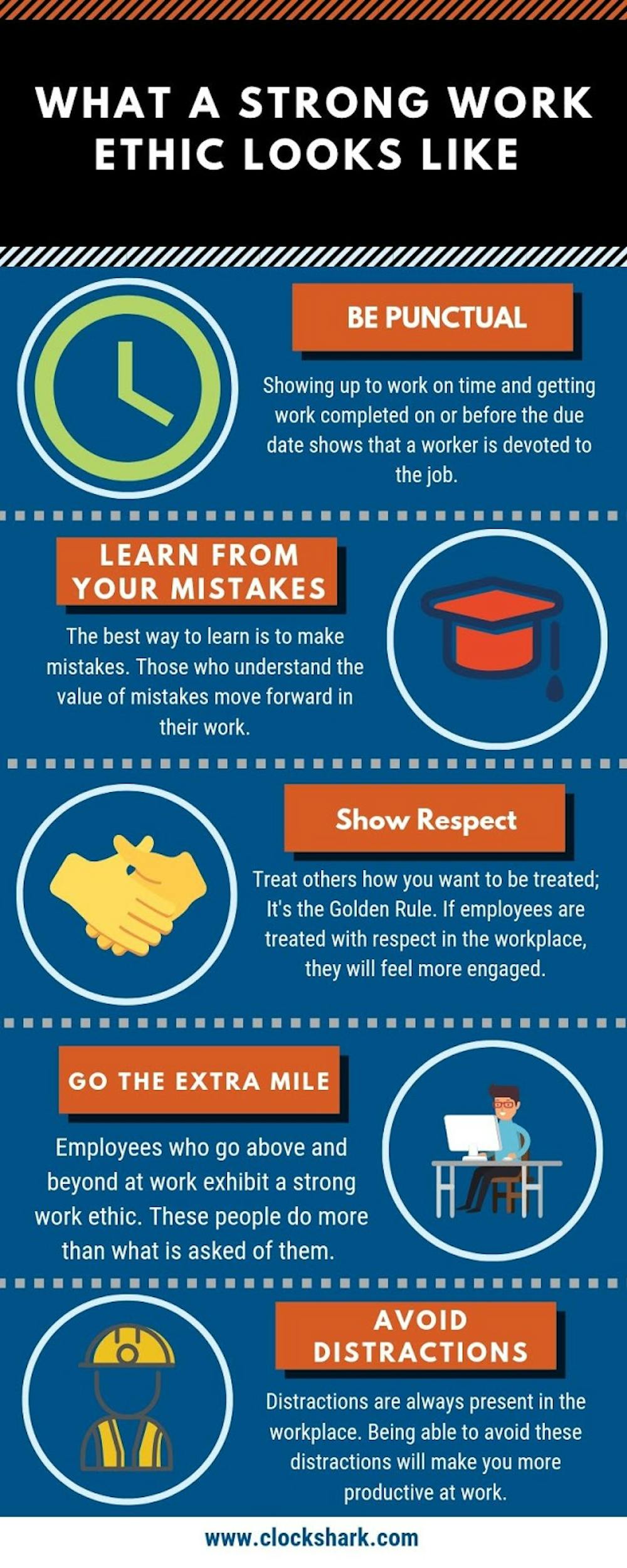As a business owner, it is important to know how to recognize a strong work ethic in your employees. The workplace will not excel if workers have a poor ethic. Employees with a strong ethic at work will help your company grow and reach its goals.
What Exactly is Work Ethic?
With numerous definitions out there for this term, it’s quite difficult to understand what it really means.
Merriam-Webster defines work ethic as “a set of values-centered on the importance of doing work and reflected especially in a desire or determination to work hard.” It is simply an umbrella term for multiple values that define your workstyle.
Why is Having a Good Work Ethic Important?
Work ethic is one of the most important factors in the workplace. It should always be under examination. Workers who exhibit a strong ethic are a reliable asset to your company. Being able to spot workers who have a strong ethic will show you who your strongest employees are.
Studies show that employers value a strong work ethic in their employees because of the economic benefits that it has. Hiring people with a good ethic puts your company on the path to success.
How do I Get a Strong Work Ethic?
No one is born with a strong work ethic. You develop and shapes itself as you advance in your career.
What is a good work ethic, you ask? Well, a good ethic at work can look like many things. From working hard to being dedicated to the work that you’re doing. This article will provide you with 5 ways to recognize a strong ethic in your employees, as well as what you can do to express it.

1. Employees Show up to Work on Time
Arriving to work on time is an almost effortless way to show a strong work ethic. An employee who shows up to work on time respects due dates and can get work done on time. Being punctual is a value that shows you are motivated and have a strong ethic at work.
Punctuality seems like an easy thing to do. However, one in five (19 percent) workers in the U.S. are late to work at least once a week. Showing up late to work can make employees look as though they are not devoted to their job.
If workers can’t show up to work on time, how can they reliant to complete tasks at work? The answer is: they simply can’t.
2. Workers Learn From Their Mistakes and Keep Moving Forward
The best way to learn is to fail. Failing can be hard for some people because they fear what others may think of them. Workers who let their mistakes halt their progress, lose the desire to succeed. Failing pushes you to learn more.
IBM’s Thomas Watson Sr. said, “the fastest way to succeed is to double your failure rate.” Workers with a strong work ethic understand the value of failing. These people are able to learn from their mistakes and move forward.
“The fastest way to succeed is to double your failure rate.” -Thomas Watson, Sr.
3. Employees Show Respect
Respect: it’s the golden rule. Though it seems to be fading, it is a very crucial factor to have in the workplace. In fact, 55% of employees say they felt more engaged at work when treated with respect.
Here is what respect can look like in the workplace:
- Avoiding gossip about work and other coworkers
- Listening to others’ opinions and questions, don’t cut people off
- Use other coworkers’ ideas to improve the quality of work
- Don’t have favorites, treat everyone equally
- Be polite and kind to those around you
A respectful employee understands his place at work and acknowledges those around him. Being respectful is a value that shows you have a strong ethic.
4. Workers Go the Extra Mile
There are those who get work done just to get it done; then there are those whose work surpasses expectations. Workers who go above and beyond what is asked, are those with a strong work ethic.
What does going the extra mile look like?
Going the extra mile is putting in extra hours at the office and showing a high level of engagement. These employees ask questions and volunteer their strengths to help other coworkers. Workers with this value are hungry for work and are always looking for extra tasks to get done.
Workers who go beyond what is expected of them express a strong work ethic; their productivity goes through the roof.
5. Employees Can Avoid Distractions
This world is full of distractions. With the workplace swarming with gossip, ringing phones, and never-ending emails, it can be quite difficult to focus.
Here are some of the biggest distractions in the workplace:
- Chatty Coworkers
- Cell Phones
- Office Noise
- Social Media
As a business owner, distracted employees should be your worst nightmare. Distractions cost American businesses $650 billion each year. This is equivalent to $4,442 per company. With such a costly outcome, hiring employees with a strong work ethic should be a top priority.
An employee with a strong work ethic knows not to let distractions get in the way of work. This worker limits cell phone usage avoids office gossip and focuses on the task at hand.
How to Spot Strong Ethics at Work During the Hiring Process
It’s quite difficult to determine someone’s work ethic when you first meet them. Here are a few things you should ask and/or look for to determine if candidates have a strong ethic at work:
- Find rewards and recognition on their resume
- Look for any promotions
- During an interview, ask candidates questions about their past work experiences. Those who give real, detailed answers will be the best candidate for the job. Here are some questions you could ask:
- Tell me about your work ethic.
- Give an example of a time you thought demonstrated your ability to work hard
- How would you describe a hard worker?
- What motivates you to work hard?
- Describe a time when you were faced with a challenge at work and how you handled it.
The hiring process is essential to make sure that you hire people who possess a strong ethic.
One Final Thought
Workers with a strong work ethic contribute greatly to the success of your company. This is why it is essential to know what values make an employee have a good ethic. All workers begin at the same place: the hiring process. This process is where you examine and determine the state of your candidate’s ethic at work. Tell us in the comments below, what other values show a strong work ethic?








